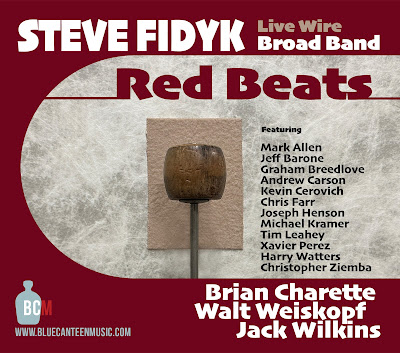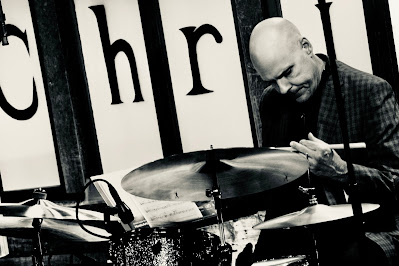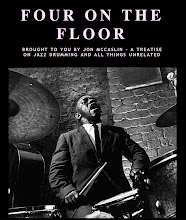Monday, March 27, 2023
Heartbeat of a Nation
Monday, March 20, 2023
Zildjian: A Tribute to Art Blakey
Tuesday, March 14, 2023
Allison Miller - Melodic Imagination
The act of using Melody to inform ones creative statements and musical choices on the drums is one quite dear to me. I think about this every time I sit down to play the drums or teach a lesson.
Allison Miller is a favourite drummer of mine these days and her approach to using Melody around the drums is compelling, to say the least.
Check out this brief footage of Miller from her PASIC 2022 appearance in which she demonstrates her melodic imagination, using Sonny Rollins' Sonnymoon for Two as the basis for her improvisation:
Monday, March 6, 2023
Steve Fidyk - Red Beats
Drummer, composer, author and educator Steve Fidyk recently released his new big band recording entitled Red Lines featuring a stellar line-up of musicians on a diverse and dynamic program of tunes and arrangements.
Steve was nice enough to take time out of his busy schedule to answer a few questions about his recent recording project.
Steve Fidyk Red Beats
Four on the Floor Interview - March 2023
1) Tell us about your latest recording!
Jon, I appreciate the opportunity to speak with you about my latest recording Red Beats. This record features nine original compositions of mine that were presented on my first three solo records (Head’s Up!, Allied Forces and Battle Lines), orchestrated for large ensemble by six different arrangers from the Washington D.C. and Philadelphia region. These guys are all buddies of mine, and over the years, I’ve performed their arrangements and compositions in big bands like the Army Blues, The Airmen of Note, and the Jazz Orchestra of Philadelphia. Some of the arrangers featured on Red Beats have even played in my small group and on the original records, so they have intimate insights and knowledge on the development of each song. It’s interesting for me to go back and listen to the original small group recordings and compare approaches in regard to structure, melodic counterpoint, and style. For a big band project like this, the leader usually arranges standards and their original music. One thing that makes this recording unique is that the compositions are written by one person, but the arrangements are reconstructed by a sextet of very talented composers in their own right. The record features soloists Brian Charette, tenor titan Walt Weiskopf, guitar legend Jack Wilkins as well as a host of incredible musicians from Philadelphia, New York, and Washington D.C. It’s a northeast corridor band for sure.
A portion of the proceeds of each Red Beats CD sold will go to help the nonprofit organization No Kid Hungry. Kids in the US today face real challenges, as families and communities work to recover from effects of the pandemic. Many people aren’t fully aware of the severity of childhood hunger in the United States. Many parents are searching to find resources available in their communities to help feed their children. I feel it’s important to try and use my music as a platform to help raise awareness and do my part to give back to organizations that are doing great work to help the less fortunate.
On my last recording Battle Lines, that organization was Warrior Beat. A nonprofit that uses professionally facilitated drum therapy to help US Military Veterans who suffer from PTSD, anxiety, and depression. For Red Beats, I’m currently dedicating efforts to our greatest resource- our children.
2) How did you choose your repertoire and sidemen?
For projects that I lead, I try to build on experiences and concepts that I learned since my last one. It’s all a process of progress that takes place in very small increments. For Red Beats specifically, each arranger had specific tunes in mind that they were interested in reworking. This project began at the start of the second year of the pandemic, and so many of the guys were excited to be a part of this and contribute their creative ideas. They all have an infinity and respect for rhythm which is one thread of consistency in regard to approach. As far as input, I tried staying out of the creative process because I wanted to hear how each would go about reimagining my original music. I’m proud of these guys. They all did an amazing job with the music. They are my good friends and I’m inspired by their playing, writing and creative energy. They make me a better musician from our long relationships and collaborations over the years. I’m blessed and thankful.
3) What inspired you to pursue the vibe and instrumentation that you did?
I’ve always wanted to lead a big band session-- a capstone project that features some of the original music from my first three solo recordings. It felt like a logical progression, and a way to acknowledge my past compositional efforts, arranged by friends that enjoy and appreciate creative, improvisational music.
4) Was there a particular message you were trying to convey to the listener?
My tune titles tend to shed light or expose the politics in our society and government. I’m not a political person but performing and living in the Washington DC area for so many years has certainly influenced my outlook. My original music is somewhat contemporary, but with strong roots in traditional swing and bebop.
5) Who are your influences with regards to your style of writing and playing?
I like a good strong melody that hooks the listener, much like a pop tune would. My compositions are simple vehicles for improvisation. That’s it. If the soloists like the progression and the groove, chances are they will feel liberated to improvise freely. If a horn player has fun improvising over the progression I came up with, then I feel like I did my job. Playing in the moment, listening, interacting, and initiating dialogue are essential elements.
Early drumming influences included Buddy Rich who was the first jazz drummer I saw perform when I was eight years old. Next came the music of Dave Brubeck, which was anchored by Eugene Wright and Joe Morello. The journey of influence and discovery continues to this day.
6) What are you practicing/studying/listening to/researching these days?
I continue to work on fundamental maintenance exercises for tone and dynamic balance at the kit. I'm always experimenting with polyrhythms orchestrated between my hands and feet, improvising on both sides of the polyrhythm for variety and tension.
I always return to the classic drummers like Philly Joe, Art Taylor, Kenny Clarke, Jo Jones, Max Roach, Shelly Manne, Mel Lewis and Joe Morello for feel, phrasing and intensity. These players created musical tension at all dynamic levels. I’m always amazed by how they could swing a band and achieve that soft intensity...You don’t hear that kind of dynamic playing as frequently today on record.
I’m also looking forward to checking out the new Kendrick Scott record Corridors with Walter Smith III.
7) What other current and future projects do you have on the go at the moment?
In addition to my teaching at Temple University, The University of the Arts and The University of Maryland, I’m booking record release shows for Red Beats.
I’ve also begun writing music for a new small group project, with plans to record sometime next year. Please stay tuned and check my web site and socials for updates.
8) How does the drums and your overall approach to rhythm factor into your compositions and concept?
Many horn players have pointed out that my tunes have interesting rhythmic ideas and counterpoint, with listenable melodies. It’s a natural extension because I’ve been playing drums for so long. Each composition I write is different, in that sometimes I begin with a chord progression, sometimes a bass line, sometimes a drum groove and sometimes a melody.
9) What drummers (or other musicians) do you consider as influences?
I would be remiss if I didn’t acknowledge my teachers. Without their help, advice, and guidance, it would be very difficult to navigate a career in music-- Angelo Stella, Ed Soph, Joe Morello, Bob Grauso, Kim Plainfield, John Riley and Ralph Peterson were all very patient and encouraging. Unfortunately, some of these men have left us, so I try to carry on their message through my music and teaching. I’ve been influenced by so many wonderful people, but it all started with my parents. They provided opportunities and encouragement to study music and believe in myself. I’ve had so much help along the way.
10) What advice do you have for younger, aspiring jazz musicians and jazz drummers?
Study and learn as much about your instrument and the music you inspire to play. It takes dedication and lots of hard work, and even then, goals and aspirations are sometimes not met. You really have to LOVE the music and listen to the musicians that have more experience than you in order to grow. Study with a reputable teacher in your community, trust what they are giving you to practice, and EXCEED their expectations by being prepared. The path to success isn't always a straight line, but if you keep your eyes and ears open, you will learn something new about the music and yourself from every twist and turn.
For more information about Steve Fidyk and his music, please visit www.bluecanteenmusic.com


























